Covid-19: No plans to close schools or for remote learning
- Published
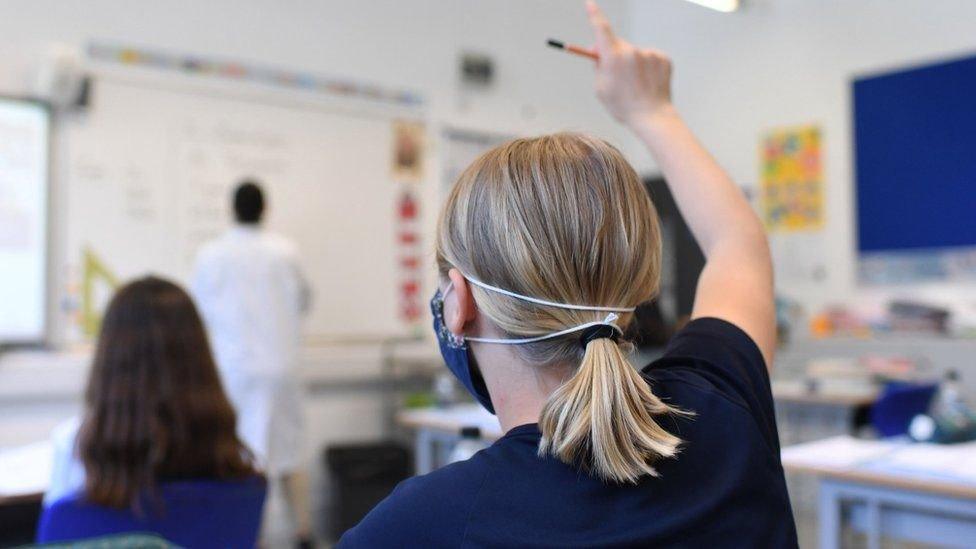
There are no plans to close NI schools early for Christmas to ease Covid-19 pressures, says the education minister
The Department of Education (DE) has said "there are no plans to close schools early this term or to move to remote learning".
That is according to a circular from DE which has been sent to all headteachers and education bodies.
Earlier Education Minister Michelle McIlveen said she understood concerns expressed by some teaching unions.
However, she told the assembly that classroom-based teaching remained the best option for all pupils.
Ms McIlveen acknowledged that the current high level of Covid infection in schools and in the community "has made it very challenging for schools".
Some schools have had to teach classes or year groups remotely on a temporary basis due to staff absences in recent weeks.
Last week, the teachers' union NASUWT called for schools to close early as a circuit breaker.
But on Monday, Ms McIlveen said that proposal could also cause "harm" to many pupils if they were to miss class.
"As a society while we're conscious of watching out for the health service, we need to be mindful that we watch out for our schools," she added.
'Maximise face-to-face teaching'
Any decision to close schools early would need to be taken by the Stormont Executive.
The circular, which is marked "essential", is to provide guidance to schools on when they can use remote learning.
It said that it was "extremely important that we maximise face-to-face teaching for pupils".
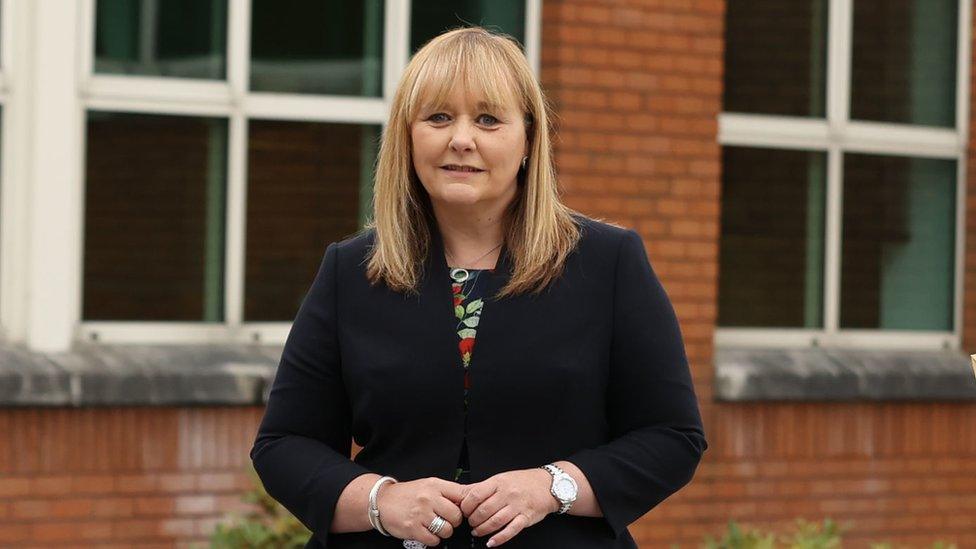
Education Minister Michelle McIlveen acknowledged the current high level of Covid infection in schools
Some principals and senior school staff have said they cannot get substitute cover when staff are off sick.
The DE circular advised principals they could move to remote learning for some pupils on a temporary basis in some circumstances.
Those are when a class has been advised to self-isolate due to Covid-19 or when there are not enough teachers or support staff for a school to operate.
However schools have been told there are other circumstances in which they should not move to remote learning, including to facilitate Christmas holidays.
"Schools should not use remote learning to facilitate study leave prior to school exams commencing; provide additional staff development time or in response to anxieties about school attendance due to Christmas holiday arrangements," the circular said.
If schools do move to remote learning due to staff shortages, they are "strongly encouraged" to continue to allow vulnerable children and those with Special Education Needs (SEN) to come to school.
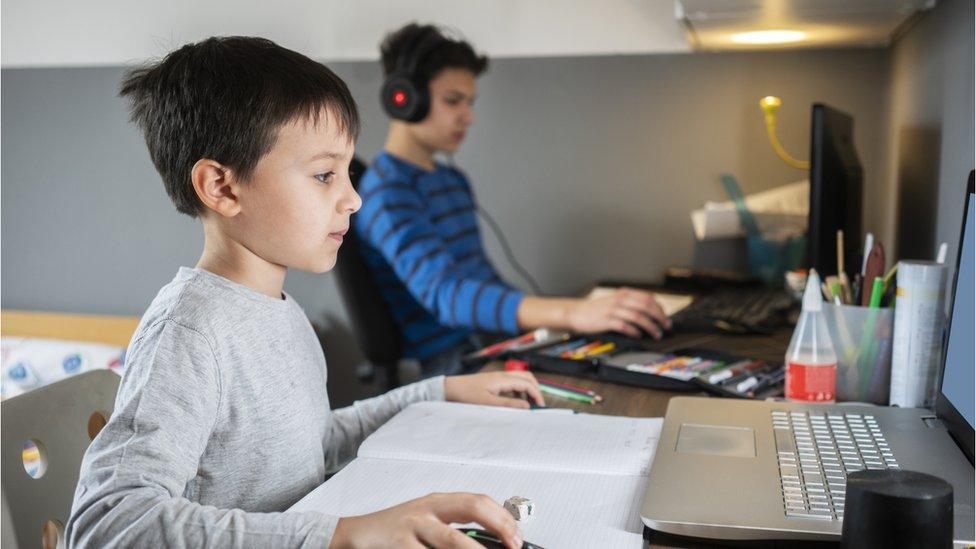
The circular notes that some children will not have resources to fully access remote learning
They are also asked to consider allowing children whose parents are both working to continue to attend school.
Post-primary schools are also asked to prioritise face-to-face teaching for years 11-14, as they are taking GCSEs, AS and A-Level qualifications.
"All schools are encouraged to actively plan for the eventuality that they may need to provide remote learning in circumstances of staff shortages," the circular said.
But it also said that not all pupils would have access to resources to learn from home, "particularly printing facilities, internet connection and data and devices such as tablets and laptops".
The Northern Ireland Commissioner for Children and Young People, Koulla Yiasouma, also recently said that "school closures must be avoided at all costs".
Ms Yiasouma said it was "untenable" for whole classes or year groups to learn from home because of staff shortages.
She welcomed suggestions that education staff currently not working in schools could be redeployed or retired teachers re-employed.
The commissioner had previously published major reports which included the negative impact being out of school had on many young people.
The New and Better Normal report said being out of school had an impact on children from lower-income backgrounds especially and widened existing inequalities.
No holiday-at-home scheme
Meanwhile a holiday-at-home voucher scheme to help boost tourism's Covid recovery in Northern Ireland will not go ahead, the economy minister has confirmed.
Gordon Lyons told the assembly he was very disappointed about the decision.
The proposal to give people discounts to visit tourist attractions was first announced last year by the Department for the Economy.

The voucher scheme would have given people discounts when visiting tourist attractions
But tourism representatives had said the draft £2m budget would need to be increased to avoid disappointment.
It is understood Mr Lyons had asked executive colleagues to agree to increase the budget for the scheme to £4m.
He said his department had been unable to confirm that the scheme would offer value for money, but that he believed strongly in the idea.
"Because I believed it would give that much needed boost, I issued a ministerial direction to my departmental accounting officer - that required it to be taken to the executive or the minister for finance," he added.
On Monday he told MLAs that although he had funding available, the executive was not willing to approve the bid.
Mr Lyons said he has been able to direct an additional £6.5m towards Tourism Northern Ireland and Tourism Ireland to help boost the promotion of Northern Ireland in Great Britain and across the world.
"I'm glad that I will be able to provide some indirect support to the sector in some way," he told BBC Radio Ulster's Evening Extra programme.
"I want to preserve their jobs. I want to make sure the tourism sector makes it through to the next financial year when I believe it will take off again."
Related topics
- Published30 November 2021
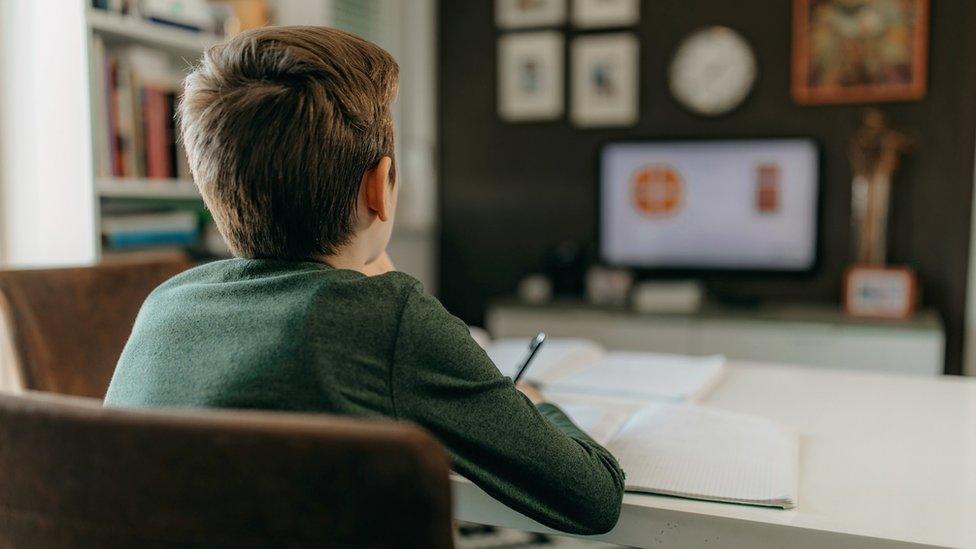
- Published2 December 2021

- Published30 April 2021
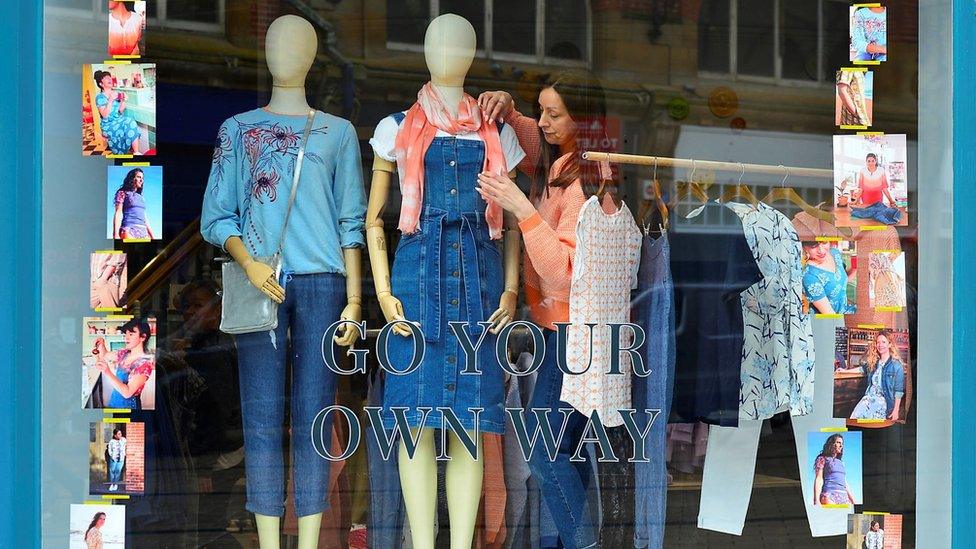
- Published17 October 2021
